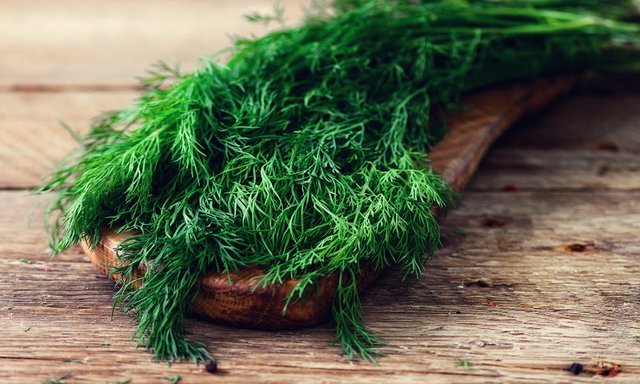
The scent of fresh dill is one of the most pleasant aromas of spring-summer cuisine. Dill is also a source of calcium, manganese, and iron, as well as many antioxidants. Dill was already used by the ancient Greeks and Romans, as a spice and as herbal medicine. The Greeks used dill essential oil to make wine. The oldest known record regarding the medicinal use of dill comes from Egypt, 5000 years ago. Probably Babylonians, circa 3000 BC they cultivated it in their gardens. Dill has been with us for a long time.
Properties of Fennel
What superpowers does dill have?
Lowers Cholesterol Levels
Research has shown that fennel extract and tablets have a pronounced effect on lipid profile, liver enzymes, gene expression, and enzymatic activity in hamsters suffering from high cholesterol.
After a month of research, it turned out that in rodents that received herbs, the lipid profile, glucose concentration, and liver enzymes significantly decreased.
Has antimicrobial activity
According to research results, dill essential oil is effective against some strains of bacteria, including Staphylococcus aureus (Staphylococcus aureus). Fennel extract can also be deadly against some molds and fungi.
Repels Insects
A study published in the Journal of Food Protection evaluated 20 plant oils for insecticidal effectiveness. Effects varied depending on insect, oils, and exposure time.
Dill oil eliminated the most insects. It was followed by yarrow and eucalyptus oil as well as tea tree oil. The results also indicate that dill oil may also be helpful in the fight against mites.
Helps to reduce menstrual cramps
A study by the Department of Biostatistics and Demography at Khon Kaen University in Thailand focused on the effects of fennel on menstrual pain among adolescents and young adult women.
They were given 12 different plant substances: dill, chamomile, cinnamon, rose, fennel, fenugreek, ginger, guava, rhubarb, milkwort, valerian. Also: fish oil, melatonin, vitamins B1 and E, as well as zinc sulfate. Everything in different forms and doses. Although the effects were not strong, they were clear. They reduced the discomfort and pain associated with cramps.
Has a positive effect on digestion and energy
In a study conducted by the American Texas Southern University and Agilent Technologies, researchers looked at oils such as fennel, cumin, coriander, anise, carrot, celery. It turned out that the main fatty acid (57-82%) found in them was petroselinic acid.
Fatty acids are the main source of energy. We usually provide a lot of fatty acids, in the diet, in the form of triacylglycerol (TAG). Some of the carbohydrates from the diet are converted into fat and stored as triacylglycerol in adipose tissue. Fatty acids from this fat are released in order to provide energy for various tissues.
The structure of TAG, as well as the distribution of fatty acids of seed oils, has a specific effect on digestion, absorption, and metabolism. So dill in the diet means more important fatty acids.
Supports antioxidant activity
In dill, some monoterpenes help the antioxidant molecule to connect with oxidized molecules.
Studies have shown that fennel’s antioxidant activity is comparable to ascorbic acid, alpha-tocopherol, and quercetin.
Supports epilepsy treatment
Epilepsy is a neurological disorder that is characterized by episodic and unpredictable seizures. Many drugs used to relieve the symptoms of this disease, unfortunately, have side effects.
For centuries, Third World countries have been using plants for epilepsy. A study published in the Malaysian journal Medical Sciences talked about the effect of dill leaves on the relief of seizures and epilepsy. Finally, fennel was evaluated as a plant that exhibits anticonvulsant properties.
Helps to alleviate the symptoms of depression
The study, published in the American Journal of Therapeutics, examined the antidepressant and analgesic properties of an aqueous solution from Moroccan fennel. It was found to have a significant antidepressant and analgesic effect compared to drugs such as sertraline and tramadol.
Dill also does not have any undesirable side effects.
Nutritional value
1 glass of fresh dill contains:
4 calories,
0,6 g carbohydarates,
0,3 g protein,
0,1 g fat,
0,2 g fiber,
675 IU vitamin A (14% recommended daily intake),
7,4 mg vitamin C (12% zds),
0,1 mg manganese (6% zds),
13,1 µg folic acid (3% zds),
0,6 mg Iron(3% zds).
Helpful Tips
Dill withers fairly quickly, so you should protect it from moisture. Therefore, wash the herb immediately before consumption.
Keep the dill in a glass or plastic container in the fridge. Sometimes it is worth dipping the stems in water and wrap the leaves with a paper towel to absorb any moisture.
Stored in the fridge, it will stay fresh for up to 10 days. However, the temperature should not be lower than 4 degrees Celsius.
In turn, frozen dill will last up to several months. If it has been washed before, it should be dried thoroughly.
Side effects and precautions
Dill – applied to the skin – can irritate. Fresh juice can increase skin sensitivity to the sun. So be careful because it can cause sunburn.
Dill is not recommended for pregnant and breastfeeding women. This is due to its menstrual properties, which can in some cases result in miscarriage. There are not enough studies to determine the effect of fennel on breastfeeding. That’s why you shouldn’t risk it.
Dill can cause allergic reactions in people who are allergic to celery plants (e.g. carrots).
Particular care should be taken by people suffering from diabetes and preparing for surgery. Fennel lowers blood glucose levels, which can lead to postoperative complications. It is therefore recommended to exclude it from the diet at least 2 weeks before the planned surgery.
Read more at healthyasabirch.com
I learned a lot about dill. Thank you.
Downvoting a post can decrease pending rewards and make it less visible. Common reasons:
Submit